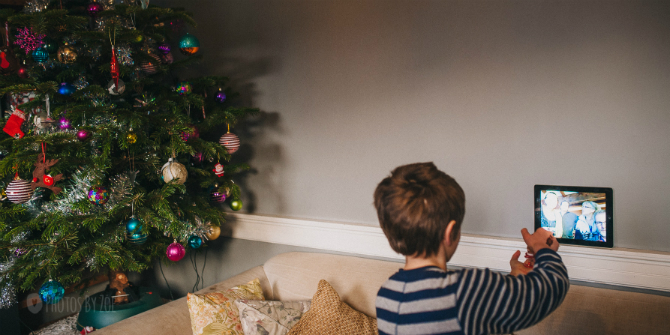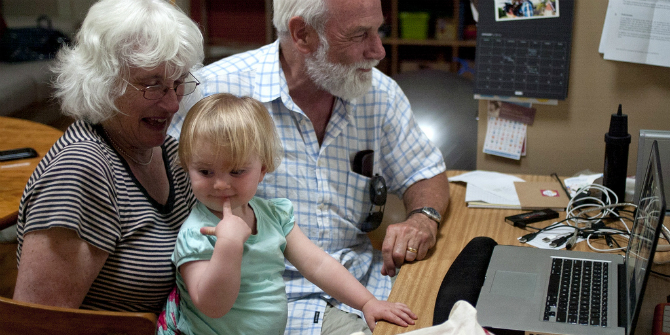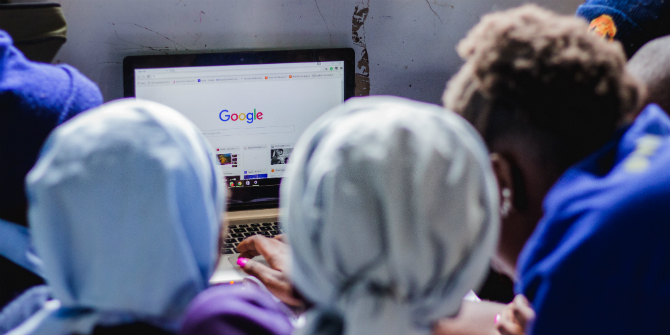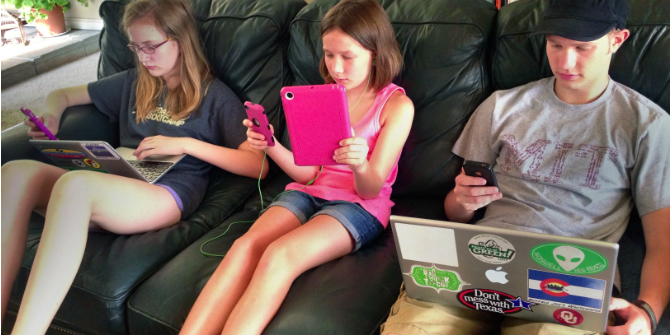 With the holidays just around the corner, Alicia Blum-Ross speaks to Yalda T. Uhls about her new book Media moms and digital dads, advice for technology and gadgets as holiday gifts, and the challenges of parenting in the digital age. Alicia is a researcher at the LSE’s Department of Media and Communications. She is interested in youth media production and is part of the Parenting for a Digital Future research project.
With the holidays just around the corner, Alicia Blum-Ross speaks to Yalda T. Uhls about her new book Media moms and digital dads, advice for technology and gadgets as holiday gifts, and the challenges of parenting in the digital age. Alicia is a researcher at the LSE’s Department of Media and Communications. She is interested in youth media production and is part of the Parenting for a Digital Future research project.
Heading into the holiday season, when many families will be buying new devices, apps or games and negotiating time together through and alongside technology, it’s a good time to reflect on what advice is out there for parents. Past messages being given to parents on how to approach digital media seem inadequate to the new realities of parenting in a digital age.
To address this gap, Yalda T. Uhls, an academic researcher and former Hollywood studio executive, has written a new book called Media moms and digital dads, which aims to give parents (or grandparents) a ‘fact not fear’ approach to parenting with technology. I interviewed Yalda about her new book, her main ‘takeaways’ for the holiday season, and how she approached making academic research accessible for everyone.¹
Your book takes a historical perspective – with quotes from across several centuries that show the same ‘media panics’. Yet many parents feel the digital age to be a ‘whole new world’. How do you honour these feelings yet acknowledge continuity?
I sympathise! And try to convince with a non-judgmental look at the research, balanced, without an agenda. As a parent, I know what it’s like to feel this way. As a scientist, I try to look at my own biases and question whether they are valid. Hopefully the book helps parents feel some relief from the panic. I was glad when one reviewer said of my book that I ‘facilitate a collective parental sigh of relief that the use of digital media, if harnessed properly, can be an enriching experience.’ I wanted my book to be research-based, with easy-to-read chapters, but with clear bottom lines that a busy parent could use. It’s a challenging time to parent; we can’t turn to the older generation and ask how would you handle this cyberbullying incident? And when the news media jumps on the stories about sexual predators, sexting and selfies, it’s only natural to become alarmed and wonder if you should be protecting your child from these dangers.
I also hope that parents can be honest about their own media habits, since there is such a high correlation between parental and children media habits. It’s not easy, but I think if you recognise your own behaviour first and decide which media behaviours you want your child to model (e.g. no texting at the dinner table or while driving), then you will be integrating those values into your parenting.
Many parents will be buying their children new technology for the holidays – any key pieces of advice to share?
Yes – do your research before buying the latest ‘hot’ toy. For example, check the ratings of any games you want to buy, and make sure they are age-appropriate. Your child may be demanding everything under the sun, and marketers will be trying to ‘sell’ them things. Moreover, their peers will be saying they are getting x, y and z, and it may not always be true, but your child will believe that it is true and tell you ‘everyone else is getting it’. Ask other parents before capitulating if it is not something you feel comfortable bringing into your home yet. It’s up to you as the parent to bring your values to the table.
Also, some of the products I have been hearing about include virtual reality and toys that connect to the internet. I don’t think we have enough research to know how these impact children (editor’s note: and there is recent evidence that kids’ toys may be hackable.) It’s important to understand how these kinds of products will affect children’s behaviour and development. I would approach buying wearables, in particular, with caution.
It isn’t explicitly talked about in your book, but do you have any particular advice for parents from lower-income communities on how to approach the issues that you raise?
I would tell parents to do the same thing I tell parents of higher-income families. Parenting is parenting – online and offline. Trust your values, learn the facts, and don’t believe all of the hype. I speak to lower-income parents, and one of the issues I see is that especially with immigrant families, the parents worry that they don’t know enough and that their kids are the experts when it comes to tech. Kids may know which buttons to press, but they need to learn the norms of communication in the real world, and it’s even harder in the virtual world which is usually text-based, so parents have real value to add even if they don’t know ‘tech’. This is true for all families. So I always encourage these parents to believe in themselves, educate themselves, and step in to provide guidance and support about the things they know about which are still important in the virtual world.
It is hard to say whether heavy investments of technology are ‘worth it’ in terms of educational value. A console is different than a computer is different than a phone, content is different and each family has different values and skills. As I mentioned, there is increasing data that shows that without the right scaffolding for kids technology is not a quick-fix for schools (e.g. the recent OECD report, which Monica Bulger previously critiqued), and the same goes for at home in terms of learning.
How do you balance between personal observations and academic evidence when writing this book and speaking to audiences? When we give academic talks about our project, audience members sometimes respond as parents rather than as researchers. What is gained (or lost) by bringing in personal experience?
That’s so funny, because I notice that, too. Trained academics rely on their own personal experience to validate the science (or discredit it). I found that having the personal experience of parenting helped a great deal as I studied child development at UCLA. It helps when you have a practical understanding of child-rearing, because it helps ground you in the real world. What is lost is time since you have other priorities besides your work! And sometimes your personal experience can cloud your interpretation of the science. I keep saying to myself, an N of 2 is not a big enough sample!
What do you think are the benefits or risks of parents sharing material about themselves or their children online?
While there is always the worse-case scenario (e.g. one blogger posted a picture of her child on the potty and later found it on a porn site), for the most part, I believe one of the biggest risks is that your teenage child will find something online that you posted that embarrasses them. Moreover, we tell our kids to be careful of their digital footprint, but have created a digital footprint of the child from birth and this could seem hypocritical. I understand the instinct; when we grew up, our parents shared photo albums, but now that we have the internet and social media, it’s permanent and too easy to share, and public. It’s important to take a long view and think about your child’s future and do your best to respect their individual right to privacy.
Modern parenting is sometimes characterised as being more ‘intensive’ or ‘anxious’ or ‘concerted’ than parenting in the past. Do you think this is valid, and do digital media play a role?
I am not sure it’s valid, because I am not sure we have real data that can track this. As far as I know there isn’t data measuring anxiety in parenting over the decades in a way we can compare apples to apples. However, digital media do allow parents to pay more attention to their children’s activities – they can track them with their phones, on social media, read their texts, and contact them at any moment. These affordances may affect parenting in both positive and negative ways.
Could you say more about how you balance between different disciplines to reach your conclusions? Neuroscientists and health researchers consider technology mainly in relationship to children and young peoples’ bodies, whereas social scientists are more interested in roles as social actors. Do you find some forms of inquiry more convincing than others?
Great question. While the neuroscience research is exciting and we are learning a great deal (and I am not an expert in this field so I am summarising conversations with colleagues), it takes time and is challenging sometimes to directly link to behavioural outcomes. In the book, I draw on all sorts of research, perhaps because of my movie exec background; I am more inclined to look at a variety of data, even market research, to share information. I don’t find any one specific field of inquiry more convincing than others. However, what I do trust most are peer-reviewed academic data, experimental vs. correlational, etc., as most scientists do.
The world of families and technology is a highly commercialised space, with new apps and gadgets marketed all the time. How much influence do you think this has on how parents make decisions for their families?
It has a great deal of influence, especially for those that have a lesser understanding of how they are being marketed to. Marketers’ jobs are to use the tools afforded to them to motivate kids and parents to buy their products. With newer forms of media, such as social media, it is challenging to understand the myriad of ways marketers ‘sell’ you something, and that is especially true for children. The recent Ofcom study highlights this. And, as I highlight in the book, marketers know that parents with younger children, who want the best for their children, have less experience parenting, and this can mean products that are not great for their kids, or don’t purport to do what they say they do (as in the case of Baby Einstein), are being pushed.
NOTES
¹ Questions and answers have been edited for clarity.






